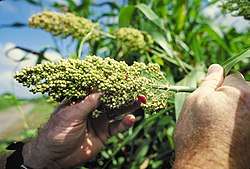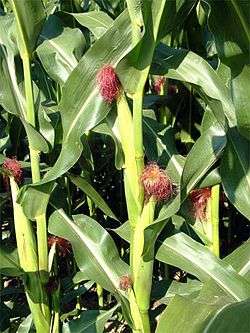唐黍
Japanese
Etymology 1

唐黍 (morokoshi kibi, morokoshi, tōkibi): sorghum.
| Kanji in this term | |
|---|---|
| 唐 | 黍 |
| もろこし Grade: S |
きび Hyōgaiji |
| kun’yomi | |
Compound of 唐 (morokoshi, “China in general; (by extension) foreign”) + 黍 (kibi, “millet”).
Pronunciation
Alternative forms
Usage notes
The longer term morokoshi kibi has been largely replaced by the shorter form morokoshi below.
Etymology 2

唐黍 (morokoshi, tōkibi): maize.
| Kanji in this term | |
|---|---|
| 唐 | 黍 |
| Grade: S | Hyōgaiji |
| Irregular | |
Abbreviation of morokoshi kibi above, with the abbreviated reading then re-applied to the entire kanji compound.[1]
Pronunciation
Alternative forms
Synonyms
Etymology 3
| Kanji in this term | |
|---|---|
| 唐 | 黍 |
| とう Grade: S |
きび Hyōgaiji |
| jūbakoyomi | |
/taukibi/ → /tɔːkibi/ → /toːkibi/
Compound of 唐 (tō, “Tang Dynasty; China in general; (by extension) foreign”) + 黍 (kibi, “millet”).[1][2]
References
- 1988, 国語大辞典(新装版) (Kokugo Dai Jiten, Revised Edition) (in Japanese), Tōkyō: Shogakukan
- 2006, 大辞林 (Daijirin), Third Edition (in Japanese), Tōkyō: Sanseidō, →ISBN
This article is issued from
Wiktionary.
The text is licensed under Creative
Commons - Attribution - Sharealike.
Additional terms may apply for the media files.